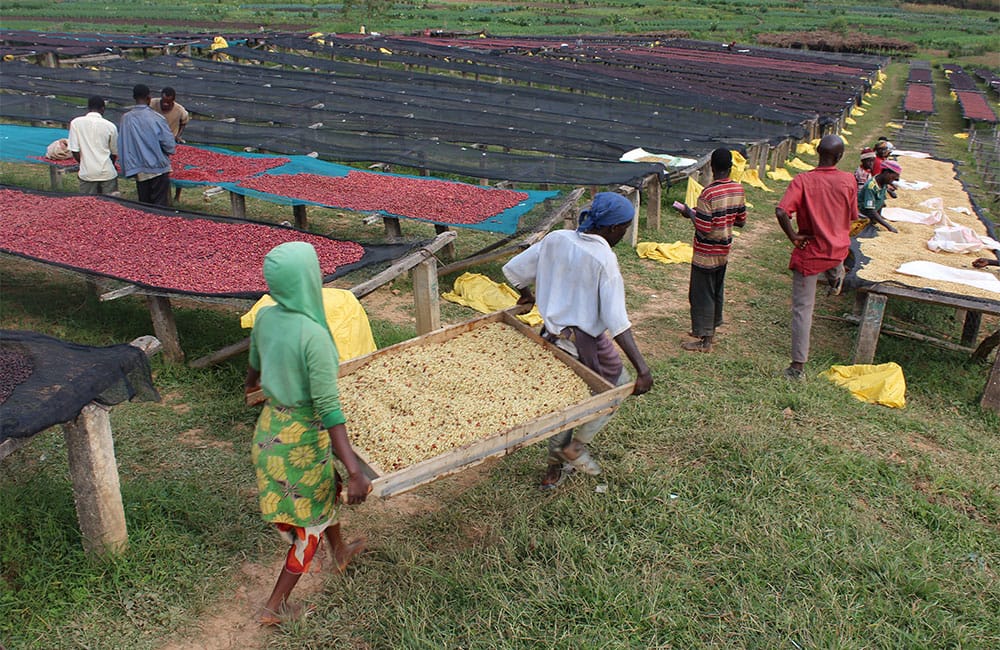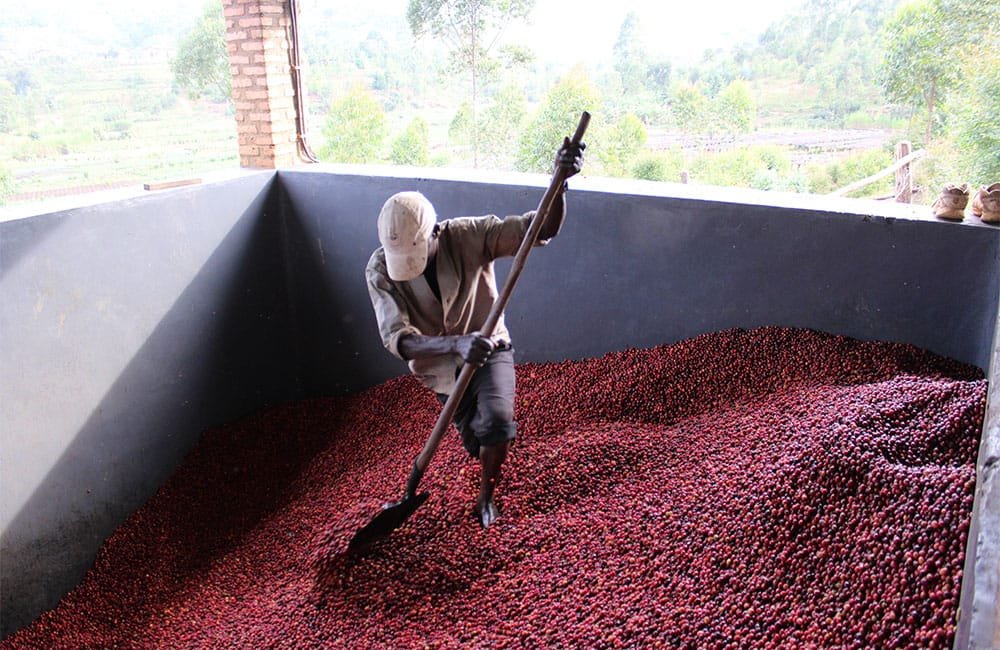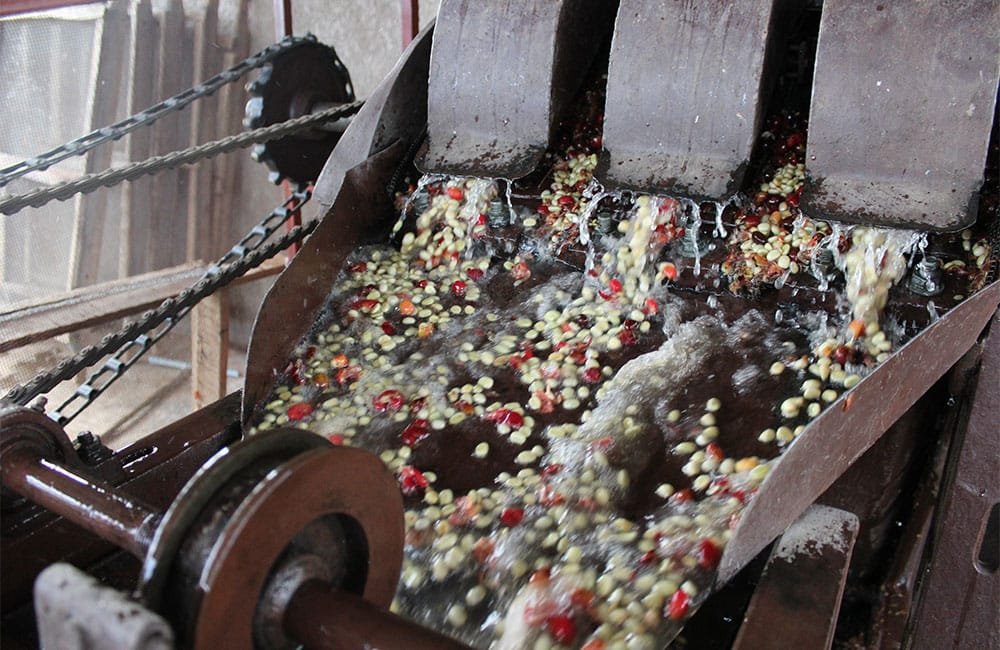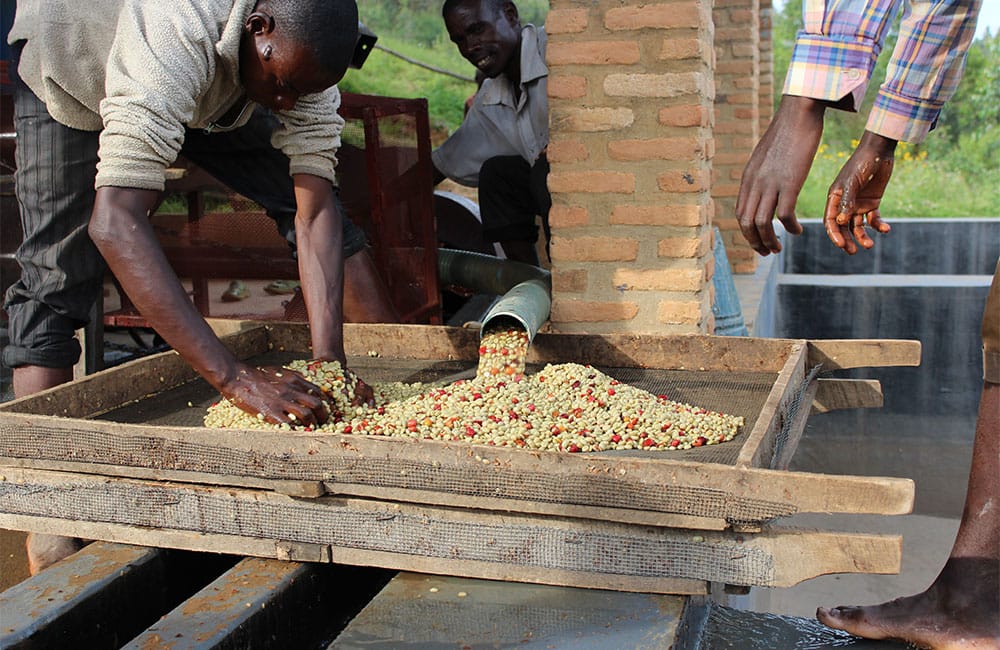Exceptional anaerobic washed coffee from Nemba in Burundi
About Nemba washing station
Nemba station lies in the northern province of Kayanza.
Each washing station is managed and led by an agronomist.
This agronomist oversees the implementation of good agricultural practice and farmer education.
They collaborate with the producers to ensure they have access to the necessary farming tools.
The agronomist also helps farmers determine and implement the practices best suited to the specific growing conditions of their farming plots.
Nemba uses a monitoring system to ensure traceability all along the production and processing chain.
All 3,000+ producers are smallholders who own an average of 150 coffee trees.
The farms delivering cherry to Nemba are all located around 1,700+ meters above sea level, near the Kibira forest.
The washing station has over two hundred drying tables and can process up to 750 metric tons of coffee cherry annually.
Nemba also participates in a number of farmer outreach and support projects including a goat and pig project, Farmer Hub, strengthening cooperatives and distributing fertilizer and coffee trees.
Cultivation of specialty coffees
Many trees in Burundi are Red Bourbon.
Because of the increasingly small size of coffee plantings, aging rootstock is a very big issue in Burundi.
Many farmers have trees that are over 50 years old, but with small plots to farm, it is difficult to justify taking trees entirely out of production for the 3-4 years it will take new plantings to begin to yield.
In order to encourage farmers to renovate their plantings, Bugestal purchases seeds from the Institut des Sciences Agronomiques du Burundi (ISABU), establishes nurseries and sells the seedlings to farmers at or below cost.
At the washing station, farmers can also get organic fertilizer derived from composted coffee pulp.
Despite the ubiquity of coffee growing in Burundi, each smallholder produces a relatively small harvest. The average smallholder has approximately 250 trees, normally in their backyards.
Each tree yields an average of 1.5 kilos of cherry so the average producer sells about 200-300 kilos of cherry annually.
The harvest season in Nemba
The average cherry buying price for Greenco in 2019 was significantly above average.
Washing stations make the first payment to farmers between 15-30 June.
The second payment comes later in the summer.
If the coffee wins a competition or sells for extremely high specialty prices, Greenco gives another payment approximately a year after the harvest season.
During the harvest season, all coffee is selectively hand-picked. Most families only have 200 to 250 trees, and harvesting is done almost entirely by the family.
Greenco knows that even small distances can be time consuming and expensive to travel for smallholder farmers, and they know that receiving cherry immediately after harvest is crucial to quality.
Therefore, smallholders can bring their cherries either directly to a washing station or to one of the 10-15 collection sites situated throughout growing areas.
Farmers are paid the same for their quality cherry regardless of where they bring their cherries. In this way, farmers are not disadvantaged due to their location and Greenco bears the cost of transport to washing station’s.
Washed anaerobic processing
After sorting, cherry is pulped within 6 hours of delivery.
During pulping, cherry is separated into high- and low-grade by density on a Mackinon 3-disc pulper outfitted with an additional separation disk.
Once pulped, coffee is placed in airtight, Epoxy-coated, concrete fermentation tanks.
Cima yeast purchased from the French company Lalcafe is added to the tanks.
The tanks are then covered and left to ferment in this environment for approximately 12 hours. LALCAFÉ CIMA™ yeast (Saccharomyces cerevisiae) was especially developed for coffee production over a four-year period of research and trials.
Trials in various regions and environments showed that Cima is well suited to better control the wet process’ efficiency and to upgrade the cup quality.
The yeast is able to control the fermentation process against the risk of spoilage microorganisms that can generate undesirable defects.
Furthermore, its specific metabolism and its high capacity of implantation even at cold temperatures (minimum 15°C inside the coffee tank) allows for the expression of fresh and fruity characteristics of the coffee beans while respecting the varietal original aromas of the beans.
The longer fermentation time for yeast processed coffees (washed processed typically ferments for about 12 hours) also allows for more developed flavors.
The extra time enables the beans to absorb metabolites, which can enhance flavors.
Complexity, acidity, brightness, floral and high notes and more are all boosted by the lengthened fermentation time.
Sorting and grading of coffee lots
After fermentation is completed, coffee is run through washing and grading canals.
In total, the channel separates beans into seven grades according to density.
After washing, this parchment is poured onto wooden trays or nylon bags and carried to the drying tables, each in its separate quality group.
Each tray and nylon bag of parchment keeps its traceability tag with all info.
The beans are then transported to the drying tables where they will dry slowly for 2-3 weeks, during which time the parchment is repeatedly sorted and sifted to ensure even drying.
The parchment is left to dry from sunrise to sunset and is covered with a sheet during the evening or when it rains. If the weather conditions are good, the parchment takes on average 10 to 14 days to dry.
The moisture level is carefully monitored and any parchment with visual defects is removed.
Once dry, the parchment coffee is then bagged and taken to the warehouse.
Greenco’s team of expert cuppers assess every lot (which are separated by station, day and quality) at the lab.
The traceability of the station, day and quality is maintained throughout the entire process.
Quality control at Greenco
The average cherry buying price for Greenco in 2019 was significantly above average.
CWSs make the first payment to farmers between 15-30 June.
The second payment comes later in the summer. If the coffee wins a competition or sells for extremely high specialty prices, Greenco gives another payment approximately a year after the harvest season.
Once dry, the parchment coffee is then bagged and taken to the warehouse. Greenco’s team of expert cuppers assess every lot (which are separated by station, day and quality) at the lab.
The traceability of the station, day and quality is maintained throughout the entire process. Before shipment, coffee is sent to Budeca, Burundi’s largest dry mill.
The coffee is milled and then hand sorted by a team of hand-pickers who look closely at every single bean to ensure zero defects. It takes a team of two hand-pickers a full day to look over a single bag.
UV lighting is also used on the beans and any beans that glows—usually an indication of a defect—is removed.
The mill produces an average of 300 containers of 320 bags per year. Budeca is located in Burundi’s new capital city, Gitega, with a population of around 30,000 people.
Since there are approximately 3,000 people working at the mill, mostly as hand pickers, this means that Budeca employs nearly 10% of the total population in Gitega for at least half the year (during the milling season).
The same is true in the provinces of Ngozi and Kayanza, where Greenco and Bugestal are the first employers in the region during the coffee harvest season.
This has an incalculable impact on a country like Burundi, with unemployment rates above 50%, especially in rural areas and among young people.
Coffee in Burundi
Burundi has long been overlooked in comparison to its neighboring East African specialty coffee producing powerhouses.
However, Burundi season, for us, is one of the highlights of the annual coffee calendar.
The country’s coffee is produced almost entirely by smallholder farmers, and much of this small-scale production is of exceptional quality.
With its super sweet, clean and often floral coffees, Burundi, every year, increasingly is putting itself on the specialty coffee map.
Coffee is of paramount importance to families and the country at large.
Considering this, improving and expanding coffee infrastructure is not just a way to improve incomes, it is a way to revolutionize the earning potential of an entire nation.
Building washing stations and expanding agricultural extension work can be great ways to improve coffee quality.
Washing stations are pivotal in improving cup profile standards and the global reputation of Burundian coffee.
Both state-owned and private actors drive Burundi’s coffee industry and play key roles as washing station management companies and exporters.
State-owned companies are called Sogestals, short for “Sociétés de Gestions des Stations de Lavage” (Washing station management companies).
Privately-owned companies can operate under a variety of different names. Sucafina’s history in Burundi goes back to 2007 when Bucafe/Sucafina Burundi was established in Bujumbura.
Through Bucafe, we work with several privately-owned washing station management companies and exporters.
Our work bridges the entire supply chain, allowing us to be vertically integrated.
Our supply chain is solid, reliable and transparent.
Due to this, we are more efficient, able to supply better value and positioned to offer both producers and consumers of Burundian coffee a diversity of expertise.








